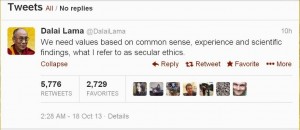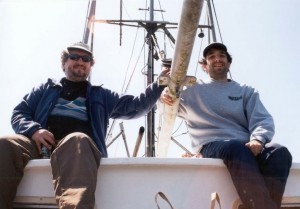I listen to a lot of podcasts. With the intellectual wasteland that is talk radio in the Lower Mainland, where every conversation or idea is a reduced to either a he-says / she-says argument between two people who are too busy hitting their “message points” to hear what the other is saying, or random uncritical repeating of press releases with no time for setting context, (and don’t get me started on call-in or person-on-the-street bitching), the options are thin. Stephen Quinn is a brilliant interviewer and engaging host, but even his work is hampered by every-10-minutes traffic reports and redundant news “updates” every half hour. As the weekends on CBC 1 have basically shifted to all “Debaters”, all the time, and the commercials have arrived on Radio 2, the wasteland is only expanding.
So while I listen to quite a bit of music, there are many times when talk works better, and occupies brain space that music cannot while doing non-thinking stuff: commuting, weed-pulling in the garden, bike maintenance, ironing. So podcasts, with their flexibility of timing and ready access fit the bill.
One of my favourites is the Skeptic’s Guide to the Universe. This weekly hour of “skeptical talk” discusses science and reason in a fun and engaging way. Not a “hard science” program, but one that often delves into pretty science-heavy topics. There are several good Science podcasts (Material World, Science Talk, etc.) but the Skeptic’s Guide stands out in what can only describe as their “skeptical approach”. The hosts and guests spend less time talking about the potential meaning of the latest “groundbreaking” new scientific study or discovery (although they often cover that), and more into the process of how a discovery was made or study was performed, and what that means about the result. In other words- they view a wide variety of topics through the lens of a rigorous application of the scientific method. They are also merciless at tearing apart bad science, bad science reporting, and the preponderance of pseudo-science that fills the modern media. They don’t do this by mocking the characters involved (well, any more than deserved, and I’m talking to you Deepak Chopra), but by systematically disassembling their bad ideas.
As a result, their show is a weekly hour-long primer on how to think. It engages you to not just question “what is the evidence?”, but to question “what is evidence?” or even “what is the evidence presented actually evidence of?”. From listening to the Skeptics Guide, I have learned to better recognize sloppy thinking and weak arguments: on my part, and on the part of others. It has also taught me about common logical fallacies and rhetorical techniques that are used when someone is trying to make a point that the data do not support.
It seems funny that I am still learning this stuff after all the time I spent in school getting degrees in science. However, that is a common failure in our current post-secondary science education system. Neither UBC nor SFU (my alma matter) require a student seeking a science degree to take a serious Philosophy of Science course (although UBC has the optional SCIE 113– which is an English writing course that discusses the topic).
I was fortunate to have an undergrad Prof (who became my supervisor for the Masters) who spent part of a mandatory second-year Structural Geology course discussing the scientific method and its application to problems. We also spent much of his upper-level course time reviewing the scientific literature, with him asking us to critique the thinking in the paper – to understand what the basic assumptions are, and how to test their validity. I learned to look at the citations of a paper, the citation of the citations, to find the root of an idea. All of this was, however, in the context of teaching structural and sedimentary geology. Frankly, I probably did not appreciate it much until I got into my Grad work and realized he had equipped me with a scientifically skeptical mind. Thanks Peter, you sneaky bastard!
However, a geology Prof shouldn’t have to sneak this into students in courses that are meant to be teaching about eigenvectors, stress vs. strain, and what those Moment Tensor solutions on the USGS Earthquakes site mean. Every science student should take a course in third year (after all the wheat-and-chaff data bashing of the first two years is out of the way, and only those really interested in a field of science remain) to teach the philosophy of science. What is evidence? How is it evaluated? What is certainty, and what is consensus, in the scientific context? How do Theory, Law, and Hypothesis interact? What is a model, and how does it compare to reality? What is the Dunning-Kruger effect? What can we learn from what we don’t know? What are the major categories of Logical Fallacies, and how do you detect them?
Why should we subject students to this scientific brainwashing? Because our brains are dirty. We all have our biases, our bad ideas, our perceptual weaknesses. We cannot avoid these, but to approach even the simplest problem scientifically, we need to recognize these problems, and find a way to isolate them from careful observation of the evidence. The more complex the scientific problem, the harder this is to do. With a high level of science illiteracy today (no higher than in the past, I suspect, but more pronounced because there is just more science to be illiterate of), there are often calls to address complex problems with liberal application of “common sense”. The problem is, “common sense” is often wrong. Common sense tells us the earth is still and the sun rotates around it. Common sense tells us that you are more likely to be killed by lightning than an asteroid impact. Common sense tells us driving your kids to school is safer than letting them walk. Common sense tells us more snow is not a predictable result of global warming. The data proves all of these ideas false. Pretty much the entire subject of Quantum Mechanics belies common sense – it is still a hell of a useful model of the subatomic universe.
 |
| His Eminence, apparently one of the great Thinkers of our time, does not clarify what to do in frequent occasion when scientific findings are contrary to “experience” or “common sense”. |
The problem with common sense (especially when biased by personal experience and inherent confirmation bias) is that we all have it, and we all rely on it too often. This is reinforced by a certain anti-intellectual bias in our current discourse. The list of ways our current Federal Government ignores, muzzles, defunds, and otherwise hinders scientific discussion is well established. Knowledge gained from decades of scientific research is given “equal treatment” in reporting on scientific topics with the opinions of the scientifically illiterate or (worse) those who are willing to give up their scientific credibility for profit. And how are we, those who are curious about scientific idea, or want to apply scientific principles to planning (never mind regular folk trying to make our way through this increasingly complex world), supposed to tell the difference?
A perfect example arrived in the Surrey Newspaper this week. Read this Letter to the Editor, which was sent in support of a scientifically-questionable opinion piece by columnist Tom Fletcher on the recent IPCC report. This letter writer was apparently of the opinion that the entire Anthropogenic Climate Change argument was a result of the world’s scientists not being able to understand decimal points. I quote:
“Never have so many known so little about basic mathematics, physics, chemistry, history and so forth. To illustrate my point, consider that the Earth’s atmosphere is 77 per cent nitrogen and 21 per cent oxygen. That leaves two per cent for all the trace gases including carbon dioxide – currently .04 of one per cent. How can a reasonable person argue that carbon dioxide is the primary driver of climate change?”
This is (as far as formal Logical Fallacies go) called “the argument from personal incredulity”, which can be summarized as “I don’t believe/understand it, therefore it must not be true”. This is an argument wrapped in the same profound lack of scientific literacy or skeptical analysis that the letter writer is accusing others of.
One can easily attack the factual failures in this specific argument (If 0.04 % is not enough to impact the climate, how much do you suppose is required? 1%? 10%? Show me your math / Somehow 0.04% is enough to support the respiration of all photosynthesizing life on earth, yet it cannot impact climate? / Ozone makes up less than 0.00007% of the atmosphere, are you equally convinced of its irrelevance to life on earth?). A more skeptical analysis would lead one to wonder how the writer has discovered a critical flaw in Climate Science that tens of thousands of scientists who work in climate, physics, chemistry, and geosciences for organizations from NASA to NOAA to the Royal Society to every major national scientific body in the world, have somehow missed due to their stunning collective scientific illiteracy? That no-one in the >150 years since the greenhouse effect caused by carbon dioxide was first discovered and measured, no scientist from John Tyndall to James Hansen, ever realized that 0.04% just wasn’t enough CO2 to matter?
No, what we have here is an example of the Dunning-Kruger effect. We have the bulk of the world’s scientists, who have been plugging away at this problem for a generation, saying they are reasonably certain (now over 95%) that human-caused CO2 emissions are the leading cause of the current observed warning, and you have Francis Patrick Jordan, of White Rock, 100% sure it is not possible because he doesn’t understand small numbers.
But Mr. Jordan is not to blame, his is a failure of the education system not preparing people appropriately for an information-saturated world. We live in a time when everyone is walking around with more raw data than the Library of Congress in their hand, the problem is not getting a hold of facts, it is being able to recognize what the value of a fact is. So when I complain that the graph Tom Fletcher included in his original article dishonestly compares mid-tropospheric temperature measurements from tropical areas with modelled global surface temperature trends (see “Stage 2 – Deny We’re the Cause” here, which two months ago pointed out the falsehood of that particular graphic, complete with references and data and such stuff that a good reporter might be interested in) and even in light of this lie, still counters Fletcher’s thesis by demonstrating a measured increase in surface temperatures on the order of 0.15C per decade during an “pause” in surface temperatures that is not only fully explained by the IPCC report, but the cause of which has been discussed openly in the scientific literature for more than a decade, people should be empowered to follow the links and recognize Fletcher for the non-skeptical, scientifically illiterate, cynical bullshitter he is.
And please, I encourage everyone to treat me with the same skepticism, but be prepared to provide the refuting data and back up your claims.
